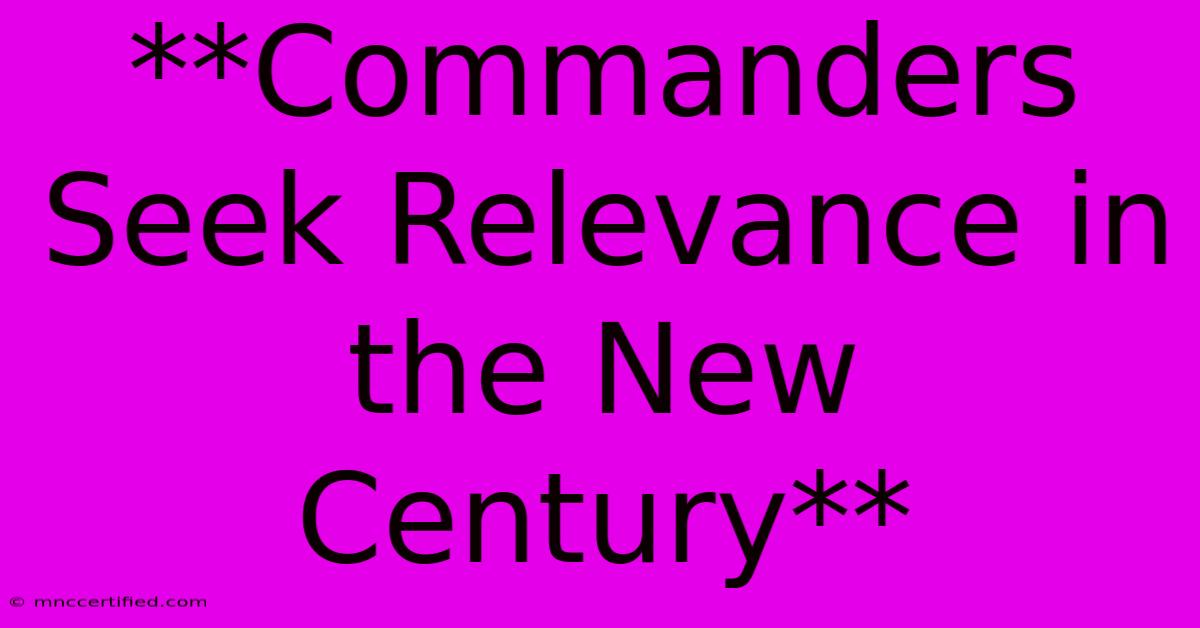**Commanders Seek Relevance In The New Century**

Table of Contents
Commanders Seek Relevance in the New Century: Adapting to a Changing World
The 21st century has ushered in a new era of challenges for military commanders. Gone are the days of predictable adversaries and clear-cut battlefields. Instead, commanders face an increasingly complex world with evolving threats, technological advancements, and a growing emphasis on diplomacy and international cooperation. This new landscape necessitates a fundamental shift in leadership philosophy and operational approaches to ensure relevance and effectiveness.
The Evolving Landscape: From Traditional Warfare to Hybrid Threats
The traditional model of warfare, focused on large-scale battles between nation-states, has given way to a more fluid and multifaceted security environment. Hybrid warfare, a blend of conventional and unconventional tactics, has become the norm. This includes cyberattacks, information warfare, and the use of non-state actors like terrorist groups and criminal organizations. Commanders must now contend with a spectrum of threats that transcend traditional boundaries, requiring a multi-dimensional approach to defense.
The Rise of Technology: Opportunities and Challenges
Technological advancements, while offering significant potential for improved military capabilities, also pose new challenges for commanders. Artificial intelligence (AI), cybersecurity, and autonomous systems are transforming the battlefield, demanding a deeper understanding of their implications and ethical considerations. Commanders need to adapt their strategies to effectively leverage these technologies while mitigating potential risks.
Diplomacy and International Cooperation: Building Partnerships
In this interconnected world, military operations are rarely conducted in isolation. Commanders are increasingly called upon to engage in diplomacy and international cooperation, fostering alliances and building relationships with partner nations. This requires a nuanced understanding of foreign cultures and political landscapes, as well as the ability to build trust and consensus.
The Importance of Adaptability: Staying Ahead of the Curve
The key to success in this evolving landscape is adaptability. Commanders must be able to think critically, embrace change, and continuously learn and grow. They need to foster a culture of innovation within their units, encouraging experimentation and the exploration of new strategies and tactics.
Embracing the New Century: A Call for Innovation
The challenges facing commanders in the 21st century are daunting, but also represent an opportunity for growth and innovation. By embracing the evolving security landscape, leveraging technology, and fostering international cooperation, commanders can ensure their forces remain relevant and effective. The future of military leadership lies in adapting to the changing world and shaping the future of defense.
Off-Page SEO Strategies:
- Build backlinks from reputable websites: Reach out to relevant blogs and news outlets to contribute guest posts or provide expert opinions on topics related to military leadership, adapting to technological advancements, or international cooperation.
- Engage on social media platforms: Share insights and analysis on current events, military advancements, and the changing role of military leadership.
- Participate in industry events: Attend conferences and seminars related to national security, defense, and military leadership to network with experts and build relationships.
- Collaborate with other organizations: Partner with think tanks, research institutions, and non-profit organizations focused on international security and military affairs.
By implementing these strategies, commanders can not only build their online presence but also enhance their reputation as thought leaders and contribute to a deeper understanding of the evolving role of military leadership in the 21st century.

Thank you for visiting our website wich cover about **Commanders Seek Relevance In The New Century** . We hope the information provided has been useful to you. Feel free to contact us if you have any questions or need further assistance. See you next time and dont miss to bookmark.
Featured Posts
-
Venezuela Brazil Match Full Highlights
Nov 15, 2024
-
November 2024 Full Moons Effect On Your Zodiac
Nov 15, 2024
-
Rachel Zegler Unleashes Foul Mouthed Trump Attack
Nov 15, 2024
-
Tate Mc Raes Third Album So Close To What
Nov 15, 2024
-
Rookie Stats Daniels Vs Robert Griffin Iii
Nov 15, 2024